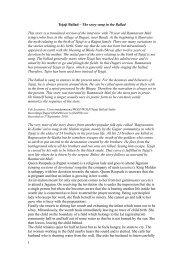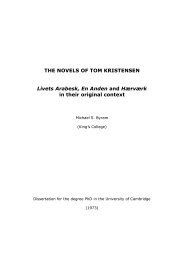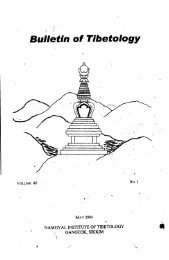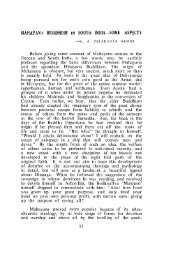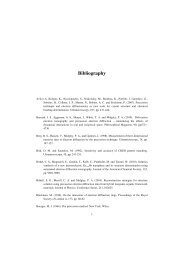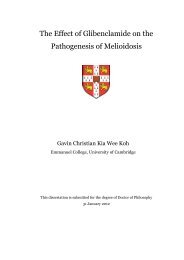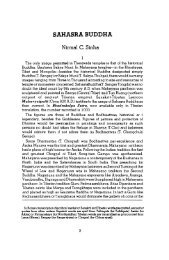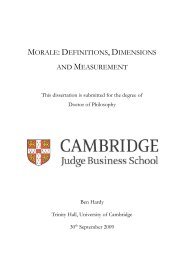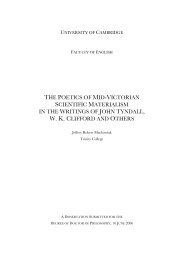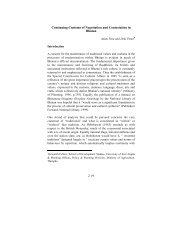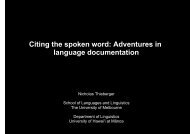The Crusades, the Genoese and the Latin East - DSpace at ...
The Crusades, the Genoese and the Latin East - DSpace at ...
The Crusades, the Genoese and the Latin East - DSpace at ...
You also want an ePaper? Increase the reach of your titles
YUMPU automatically turns print PDFs into web optimized ePapers that Google loves.
All <strong>the</strong> records th<strong>at</strong> contain such restrictions in <strong>the</strong> instructions to <strong>the</strong> travelling<br />
merchants begin by specifying <strong>the</strong> first destin<strong>at</strong>ion of <strong>the</strong> venture. From <strong>the</strong> first destin<strong>at</strong>ion <strong>the</strong><br />
merchants were given <strong>the</strong> permission to proceed wherever <strong>the</strong>y think best. <strong>The</strong>n <strong>the</strong> restrictions<br />
were inserted. For example, a <strong>Genoese</strong> merchant named Buonovassallo Cabella registered two<br />
contracts th<strong>at</strong> had such restrictions in 1203. Interestingly, <strong>the</strong> two travelling merchants were both<br />
instructed to travel to Alex<strong>and</strong>ria first on board <strong>the</strong> same ship called <strong>the</strong> Torexana. This in itself is<br />
quite a rare condition. Contracts from <strong>the</strong>se years usually specified ship names only in cases th<strong>at</strong><br />
involved pledges, particularly, sea-loans or maritime insurance. One of <strong>the</strong> travelling partners,<br />
Giovanni Sardo, is an extraordinary example of a slave who was sent on a venture. Ansaldo<br />
Rapallino, his master, allowed this journey to <strong>the</strong> east <strong>and</strong> <strong>the</strong> commenda contract, <strong>the</strong>refore,<br />
specified th<strong>at</strong> it was signed 'jussu Ans<strong>and</strong>i (sic) Rapallini sui dominl' [my emphasis]. In th<strong>at</strong><br />
contract Buonovassallo instructed Giovanni to join Guglielmo Buccucio in Alex<strong>and</strong>ria <strong>and</strong> travel<br />
with him wherever he goes, except for <strong>the</strong> kingdom of Jerusalem <strong>and</strong> Byzantium. 174<br />
Vivaldo Rapallino Fabiano was <strong>the</strong> second merchant with whom Buonovassallo signed a<br />
contract. He was similarly instructed to sail on <strong>the</strong> Torexana to Alex<strong>and</strong>ria <strong>and</strong> <strong>the</strong>n his travel<br />
route became complic<strong>at</strong>ed because he had to proceed `quo sibi Deus aministraverit causa<br />
merc<strong>and</strong>i, excepto Ultramare et in Romania et in Siciliam. i175 <strong>The</strong>se two cases contained detailed<br />
instructions, including <strong>the</strong> name of <strong>the</strong> ship as well as <strong>the</strong> lists of prohibited destin<strong>at</strong>ions. Because<br />
both contracts were signed with <strong>the</strong> same residing merchant it seems likely th<strong>at</strong> <strong>the</strong>se cases<br />
represent personal preferences. <strong>The</strong>y tell more about <strong>the</strong> personality of Buonovassallo de Cabella,<br />
<strong>the</strong> merchant who dict<strong>at</strong>ed <strong>the</strong> restrictions.<br />
In ano<strong>the</strong>r case, <strong>the</strong> detailed instructions seem to be rel<strong>at</strong>ed to <strong>the</strong> age of travelling<br />
merchants or <strong>the</strong>ir lack of experience. Guglielmo B<strong>at</strong>ifoglio signed two consecutive contracts in<br />
which he promised to travel to <strong>the</strong> kingdom of Jerusalem with two different residing merchants.<br />
In both records Guglielmo declared himself over twenty <strong>at</strong> <strong>the</strong> time of <strong>the</strong> sign<strong>at</strong>ure. In addition,<br />
<strong>the</strong>re are also uncommon details specified, such as <strong>the</strong> freights taken abroad, <strong>the</strong>ir quantities <strong>and</strong><br />
<strong>the</strong>ir values. Guglielmo gained permission to continue from Ultramare to wherever he thought<br />
best; however, both contracts <strong>the</strong>n limit his decision making: `excepto in Romania et in Sicilian:<br />
et in stallo de Ultramare. '176 <strong>The</strong>re is no explan<strong>at</strong>ion in <strong>the</strong> text why <strong>the</strong>se destin<strong>at</strong>ions were<br />
prohibited. <strong>The</strong>re is also no more inform<strong>at</strong>ion provided to wh<strong>at</strong> was meant by `stallo de<br />
Ultramare. i177 <strong>The</strong> elabor<strong>at</strong>e details <strong>and</strong> <strong>the</strong> list of prohibited destin<strong>at</strong>ions seem to suggest th<strong>at</strong> it<br />
174 GG, no. 649, from 20 September 1203.<br />
'" GG, no 661, from 20 September 1203.<br />
16 GG, nos. 694 695 from 21 September<br />
- 1203.<br />
"' <strong>The</strong>se two contracts are <strong>the</strong> only time this term was mentioned in <strong>the</strong> cartularies examined in this<br />
dissert<strong>at</strong>ion. David Jacoby suggested th<strong>at</strong> <strong>the</strong>re is a misreading for S<strong>at</strong>alia, visited by <strong>Genoese</strong> since 1156 <strong>at</strong><br />
60



